Diplomatic Bluebook 2021
Chapter 2
Japan's Foreign Policy by Region
7 Regional and Inter-regional Cooperation
In the Indo-Pacific region, the world's growth center, it is important to ensure peace and prosperity for the entire region, and by extension for the world, by realizing a free and open order based on the rule of law. From this perspective, Japan strategically advances initiatives toward realizing a “Free and Open Indo-Pacific (FOIP)” through various regional cooperative frameworks, including Japan-ASEAN, Japan-Mekong cooperation, ASEAN Plus Three (Japan, China and the Republic of Korea (ROK)), East Asia Summit (EAS), Japan-China-ROK trilateral cooperation and Asia-Pacific Economic Cooperation (APEC), while maintaining the Japan-U.S. Alliance as the cornerstone of its foreign policy. Based on this idea, Japan has been collaborating with like-minded countries. In particular, the “ASEAN Outlook on the Indo-Pacific” (AOIP), which was adopted by ASEAN in 2019, shares fundamental principles with FOIP, such as the rule of law, freedom and openness. While respecting the centrality and unity of ASEAN, Japan, as an “Indo-Pacific State,” intends to embody Japan-ASEAN cooperation in line with the AOIP and contribute to the stability and prosperity of the entire Indo-Pacific region.
(1) The Association of Southeast Asian Nations (ASEAN)
Located in the center of the vast Indo-Pacific, ASEAN is key to the realization of a “Free and Open Indo-Pacific.” At the ASEAN-related Summit Meetings held in November 2015 (Kuala Lumpur, Malaysia), it was declared that the three councils of the “ASEAN Political-Security Community Council,” the “ASEAN Economic Community Council” and the “ASEAN Socio-Cultural Community Council” would be established within 2015 (2015 Kuala Lumpur Declaration on the Establishment of the ASEAN Community). Also, “ASEAN2025: Forging Ahead Together” was adopted as a guiding policy for the ASEAN Community for the 10 years from 2016 to 2025. In June 2019, the “ASEAN Outlook on the Indo-Pacific” was adopted, which sets forth principles such as openness, transparency, inclusivity and a rules-based framework.
In East Asia where ASEAN plays an important role as a center of regional cooperation, multi-layered regional cooperation, such as ASEAN Plus Three (Japan, China and the ROK), East Asia Summit (EAS) and ASEAN Regional Forum (ARF), is operating with ASEAN at its center, and cooperative relationships in a wide range of areas including politics, security and the economy have been established.
On the economic front, ASEAN has concluded the ASEAN Free Trade Area (AFTA) as well as other EPAs and FTAs with various countries including Japan, China, the ROK and India, thereby expanding the ASEAN centered free trade zone. At the 4th RCEP Summit in November 2020, the negotiations came to fruition after approximately eight years, and the RCEP Agreement was signed by 15 countries, including Japan and 10 ASEAN countries. While aiming for the early entry into force of the RCEP Agreement, Japan will continue to play a leading role for the future participation of India to the Agreement, as India declined signing this time.
(2) Issue of the South China Sea
The issue with regard to the South China Sea is directly related to the peace and stability of the region and is a legitimate concern of the international community. As a stakeholder that makes use of the South China Sea, the issue is also an important matter of interest for Japan, which depends on sea transport for most of its resources and energy. It is necessary for the international community to cooperate toward the maintenance and development of open and stable seas.
In 2020, China announced the establishment of new administrative districts called the “Nansha District” and the “Xisha District,” and has continued and strengthened its unilateral changes to the status quo that go against the rule of law and openness, such as the further militarization of reclaimed features (see Chapter 4, Section 2, 3 (4)). Actions that increase tensions in the region such as repeated military exercises and missile launches can also be seen. Furthermore, China has not changed its position of not accepting the Arbitral Tribunal's award23 to the Philippines and China, and has continued to assert maritime claims that are inconsistent with the United Nations Convention on the Law of the Sea (UNCLOS).
The international community, including Japan, has expressed serious concerns about China's unilateral attempts to change the status quo and render them faits accomplis. Amidst this, Japan, from the standpoint that the three principles of the rule of law at sea should be consistently adhered (see Chapter 4, Section 2, 6 (2)), has also emphasized the importance of all the concerned parties related to the South China Sea to work toward peaceful settlement of disputes based on international law, in particular UNCLOS. Additionally, Japan has pointed out that China's assertions regarding baselines in the South China Sea are not based on relevant provisions of UNCLOS and that it is important to protect the freedom of navigation and overflight, including in the sea and airspace surrounding and above maritime features found to be low-tide elevations that do not have territorial sea and territorial airspace of their own according to the award of the Arbitral Tribunal. Japan has also pointed out that the basis of the “historical rights” claimed by China is not clear under international law, and the Arbitral Tribunal ruled that the “historical rights” based on the “nine-dash line” claimed by China were found to be contrary to UNCLOS and were clearly denied.
In 2018, negotiations on the Code of Conduct (COC) in the South China Sea commenced between China and ASEAN. Japan considers that the COC should be effective, substantive, consistent with UNCLOS and respect the legitimate rights and interests of all stakeholders who use the South China Sea, and has advocated for the importance of such efforts leading to demilitarization of the area and to the realization of a peaceful, open South China Sea.
- 23 In January 2013, the Government of the Philippines instituted arbitral proceedings under the United Nations Convention on the Law of the Sea (UNCLOS) as to the disputes between the Philippines and China regarding the South China Sea under the United Nations Convention on the Law of the Sea (UNCLOS). The Arbitral Tribunal organized by these proceedings rendered the final award on July 12, 2016. Japan issued a statement by the Foreign Minister on the same day, stating, “As the Tribunal's award is final and legally binding on the parties to the dispute under the provisions of UNCLOS, the parties to this case are required to comply with the award. Japan strongly hopes that the parties' compliance with the award will eventually lead to the peaceful settlement of disputes in the South China Sea.”
(3) Japan-ASEAN Relations
Located in the center of the vast Indo-Pacific, ASEAN is key to the realization of a “Free and Open Indo-Pacific.” Realizing a more stable and prosperous ASEAN is absolutely essential to the stability and prosperity of the region as a whole. Based on this recognition, Japan has announced that it will actively support ASEAN's efforts in accordance with “ASEAN Community Vision 2025” for further integration even after the establishment of the ASEAN Community, while steadily implementing the “Vision Statement on ASEAN-Japan Friendship and Cooperation” and the “Joint Statement” that were both adopted at the ASEAN-Japan Commemorative Summit Meeting held in Tokyo in 2013.
In 2020, through the Japan-ASEAN Foreign Ministers' Meeting in September held under Viet Nam, the ASEAN Chair, via teleconference, and the 23rd Japan-ASEAN Summit Meeting held in November, the participants affirmed that they would continue to further strengthen cooperative relations over a broad range of fields and that Japan-ASEAN cooperation in the four priority areas of the AOIP will be materialized. At the Japan-ASEAN Summit Meeting in November, Prime Minister Suga stated that the “ASEAN Outlook on the Indo-Pacific (AOIP),” which ASEAN adopted in 2019 under its own initiative, sets forth the rule of law, openness, freedom, transparency and inclusivity as ASEAN's principles of action, and he announced Japan's full support for the AOIP, saying that it has many fundamental commonalities with Japan's “Free and Open Indo-Pacific (FOIP),” and that sharing these fundamental principles is the cornerstone of cooperation between Japan and ASEAN.
In addition to the Chair's Statement, the Joint Statement of the 23rd ASEAN-Japan Summit on Cooperation on the AOIP was issued with the support of all ASEAN member countries. It states that the AOIP and FOIP share relevant fundamental principles in promoting peace and cooperation, and confirms that the Japan-ASEAN Strategic Partnership will be further reinforced in the four areas outlined in the AOIP, namely, maritime cooperation, connectivity, the UN Sustainable Development Goals 2030 and economic and other possible areas of cooperation. On that basis, Japan announced specific cooperation projects in the four areas of the AOIP, and for connectivity in particular, Prime Minister Suga launched the “Japan-ASEAN Connectivity Initiative,” with a focus on two trillion-Japanese yen worth of ongoing quality infrastructure projects. Prime Minister Suga also announced that Japan would strengthen the connectivity of land, sea, and air corridors through infrastructure development, together with capacity building projects for 1,000 individuals over the next three years.
Japan announced its full support for the ASEAN Centre for Public Health Emergencies and Emerging Diseases at the Special ASEAN Plus Three Summit on COVID-19 in April, and at the Japan-ASEAN Summit Meeting an establishment event for the Centre was held. The establishment of the Centre was officially announced by Prime Minister Nguyen Xuan Phuc of Viet Nam (the ASEAN Chair, and the Coordinating Country for Japan) at the event, based on the results of the Feasibility Study, which was conducted following the Special ASEAN Plus Three Summit on COVID-19, in light of the ASEAN's needs and with input from experts in the region. Prime Minister Suga stated that Japan would continue to make every effort to provide support, including through technical cooperation by JICA through dispatching experts and providing training, to help the Centre develop into a strong organization that, as a hub for the region's fight against infectious diseases, protects the people of ASEAN from the threat posed by infectious diseases.
Through these series of meetings, ASEAN expressed gratitude for Japan's cooperation in responding to COVID-19, such as the establishment of the Centre and the contribution of one million US dollars to the COVID-19 ASEAN Response Fund.
As for regional and international affairs, with regard to North Korea, Prime Minister Suga said that there is no time to lose before we resolvethe abductions issue, calling for the continued understanding and cooperationof each country toward the early resolution of the abductions issue, and ASEAN expressed their support. On the South China Sea issue, Prime Minister Suga expressed serious concerns about unilateral attempts to change the status quo and stated that legitimate rights under international law, including freedom of navigation and overflight, should be respected.
In the economic field, through official development assistance (ODA) and the Japan-ASEAN Integration Fund (JAIF), Japan has been supporting the further deepening of ASEAN integration and unity in a variety of fields, such as support for narrowing the development gap in the region through strengthening ASEAN connectivity. At the Japan-ASEAN Summit meeting in November, Prime Minister Suga announced that, through the “Japan-ASEAN Economic Resilience Action Plan” that was issued at the Special ASEAN Economic Minister (AEM)-METI Consultations in July, Japan would support the strengthening of supply chains and businesses that promote social change through utilizing digital technologies. Additionally, Prime Minister Suga stated that Japan would like to accelerate a “virtuous cycle of economic growth and environmental protection” through innovation, and that Japan would cooperate with ASEAN countries to realize a decarbonized society as called for by the Paris Agreement.
The novel coronavirus disease (COVID-19) has been raging across the world and has greatly impacted societies and economies in the Indo-Pacific region. The number of infected people and deaths is still increasing around the world as of the end of December, and the large-scale lockdowns and other restrictions are having severe impacts on citizens' lives.
ASEAN*1, which has been a long-term partner of Japan, is no exception. Even in the ASEAN region, which had recorded a low number of infections at the start of the year, the number of infections increased rapidly in some countries around April, highlighting the importance of countermeasures against infectious diseases. This region has close geographical, social and economic ties with Japan, and many Japanese companies have expanded their businesses in the region. Strengthening ASEAN's regional capabilities to cope with infectious diseases not only contributes to the region as a whole, but is also extremely important from the perspective of ensuring the safety of Japanese people living in the region as well as preventing the spread of infectious diseases in Japan. Furthermore, for Japan, which promotes a “Free and Open Indo-Pacific” as a pillar of its diplomacy, supporting efforts to strengthen the infectious disease response system in ASEAN countries, which is key to achieving the goal, is a top priority.
Under these circumstances, at the Special ASEAN Plus Three (Japan-China-ROK) Summit on Coronavirus Disease 2019 (COVID-19) held via video conference on April 14, at the request of the ASEAN Secretariat, Prime Minister Abe expressed that Japan will provide strong support for ASEAN based on three pillars: the strengthening of infectious disease response capability, the ASEAN Centre for Public Health Emergencies and Emerging Diseases, and support for strengthening the resilience of the economy.
The ASEAN Centre for Public Health Emergencies and Emerging Diseases, positioned as a regional resource hub, aims to strengthen ASEAN's preparation, detection and response capabilities to public health emergencies and emerging diseases. Specifically, it is planned to enhance surveillance and field epidemiology, create regional reference laboratory networks*2 and conduct training for personnel responsible for public health emergencies and emerging diseases, among others. Japan has contributed approximately 5.5 billion Japanese yen (50 million US dollars) to the Japan-ASEAN Integration Fund (JAIF) for the establishment of this Centre.
With a view to establishing the Centre as soon as possible without losing momentum, Japan has conducted a feasibility study (FS) from June, in cooperation with experts from ASEAN as well as various regions and organizations, including the U.S., Australia and the World Health Organization (WHO).
Preparations for the establishment of this Centre have been moving forward together with ASEAN, with full respect for ASEAN's needs and intentions, and the ASEAN member states have shown great interest in the initiative. The Mekong countries welcomed Japan's cooperation at the Mekong-Japan Foreign Ministers' Meeting held in July, while ASEAN member states commended Japan's cooperation at the Japan-ASEAN Foreign Ministers' Meeting and expressed that they were looking forward to the official announcement of the establishment of this Centre at the upcoming Japan-ASEAN Summit Meeting. It was officially announced at an event to mark the establishment of the Centre following the 23rd Japan-ASEAN Summit Meeting in November. On this occasion, the leaders of the ASEAN member states expressed their deep appreciation for Japan's support.
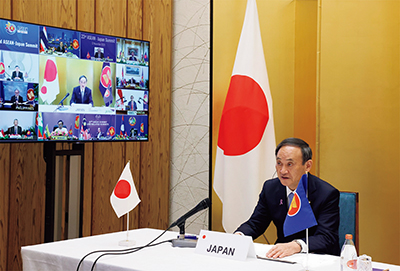 At the 23rd Japan-ASEAN Summit Meeting where the establishment of the ASEAN Centre for Public Health Emergencies and Emerging Diseases was announced (November 12, Tokyo; Photo: Cabinet Public Relations Office)
At the 23rd Japan-ASEAN Summit Meeting where the establishment of the ASEAN Centre for Public Health Emergencies and Emerging Diseases was announced (November 12, Tokyo; Photo: Cabinet Public Relations Office)To develop the ASEAN Centre for Public Health Emergencies and Emerging Diseases into an organization that protects the people of ASEAN from the threat of infectious diseases as a regional hub for public health emergencies and emerging diseases, Japan will spare no effort in providing continuous support to accelerate this initiative while offering its knowledge to the greatest extent. Going forward, Japan, as a true friend of ASEAN, will continue to work together with the region to overcome this difficult time and advance firmly toward realizing greater prosperity for a “Free and Open Indo-Pacific.”
- *1 ASEAN comprises the following 10 member states: Brunei, Cambodia, Indonesia, Laos, Malaysia, Myanmar, the Philippines, Singapore, Thailand, and Viet Nam. (Singapore and Brunei are not eligible to receive official development assistance (ODA).)
- *2 A network of reference laboratories with a view to realizing early testing of pathogens among others
(4) Mekong-Japan Summit Meeting (Participating Countries: Cambodia, Laos, Myanmar, Thailand, Viet Nam and Japan)
The Mekong region (Cambodia, Laos, Myanmar, Thailand and Viet Nam) is the core of the Indo-Pacific and is Japan's Strategic Partner with strong economic growth and potential. Peace and prosperity in the Mekong region are extremely important to Asia as a whole, including Japan, since it will contribute to narrowing the development gap in the region and promoting regional integration within ASEAN. Japan has been holding the Mekong-Japan Summit Meeting every year since 2009 in order to steadily implement Mekong-Japan cooperation. This year, 2021, is the once in three year time when the Mekong-Japan Summit Meeting is held in Japan, and Japan and the Mekong countries will lead the region during the year as the “Japan-Mekong Year.”
At the 12th Mekong-Japan Summit Meeting held via video conference in November, Prime Minister Suga reiterated that Japan, as an “Indo-Pacific State,” will continue to contribute to the peace and prosperity of the region, and the Mekong countries welcomed the steady progress of Mekong-Japan cooperation and thanked Japan for its efforts. At the Summit Meeting, Japan announced its “Five Points of Cooperation” ((1) Promotion of loans and investment for the private sector, (2) Grant assistance for grass-roots human security projects that pervade through small communities, (3) Cooperation concerning the rule of law, (4) Cooperation concerning the ocean, and (5) Cooperation concerning strengthening supply chains). The Joint Statement adopted at the Summit Meeting highly evaluated Japan's strong commitment to the Mekong region, including Prime Minister Suga's visit to Viet Nam in October and Foreign Minister Motegi's visit to Cambodia, Laos and Myanmar in August, and additionally reaffirmed the determination of the leaders to work together to accelerate the realization of the Ayeyawady–Chao Phraya–Mekong Economic Cooperation Strategy (ACMECS). Japan will continue to contribute to the prosperity and development of the region as a reliable partner for Mekong region countries (see the Special Feature on page 92).
The five countries of Cambodia, Laos, Myanmar, Thailand and Viet Nam, located along the Mekong River basin on the Indochina Peninsula of Southeast Asia are known as the Mekong countries. These five countries cover a total area of about 1.94 million km2 (about five times of Japan's land area) and have a total population of about 244 million people. There are great expectations for the development of this region as one with especially great future potential even within fast-growing Asia. This region is also connected to China, India, and the South China Sea, and is strategically positioned at the center of Asia's land and sea transportation routes. Japan has close economic and trade relations with the Mekong countries, and strengthening relations with these countries that are the core of the Indo-Pacific region is of great diplomatic importance for Japan.
To ensure the steadily implementation of Mekong-Japan cooperation, the Mekong-Japan Foreign Ministers' Meeting and the Mekong-Japan Summit Meeting have been held every year since 2008 and 2009 respectively. Of these, the future course for Mekong-Japan cooperation is updated every time when a Summit Meeting is held in Japan (about once every three years). 2021 is the year when this Mekong-Japan Summit Meeting is due to be held in Japan and a very important year when the leaders of the Mekong countries visit Japan to set out the future course of Mekong-Japan cooperation for the next three years. It will truly be the “Mekong-Japan year,” in which Japan and the Mekong countries will lead the region.
The past three years of Mekong-Japan cooperation began in October 2018 with the convention of the 10th Mekong-Japan Summit Meeting in Tokyo and the adoption of the Tokyo Strategy 2018 for Mekong-Japan Cooperation, which sets out the direction of Mekong-Japan cooperation for the future. This Strategy establishes the following three pillars for advancing cooperation: (1) vibrant and effective connectivity; (2) people-centered society; and (3) realization of a green Mekong. Toward the realization of a “Free and Open Indo-Pacific,” efforts have been made to promote cooperation in line with this Strategy in areas such as infrastructure development, human resource development and digitalization.
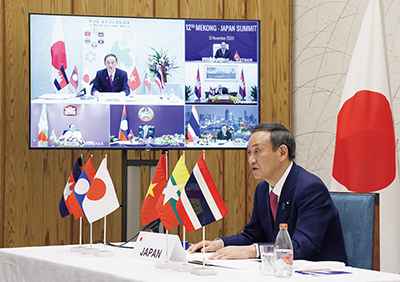 12th Mekong-Japan Summit Meeting (November 13. Photo: Cabinet Public Relations Office)
12th Mekong-Japan Summit Meeting (November 13. Photo: Cabinet Public Relations Office)The “Mekong-Japan Initiative for SDGs toward 2030” was announced at the 11th Mekong-Japan Summit Meeting held in Bangkok (Thailand) in November 2019. This Initiative aims to draw out the Mekong region's potential in an optimal manner. While making use of quality infrastructure investment in accordance with international standards, Japan intends to address the following three fields as areas of priority: (1) environmental and urban issues; (2) sustainable natural resource management and utilization; and (3) inclusive growth.
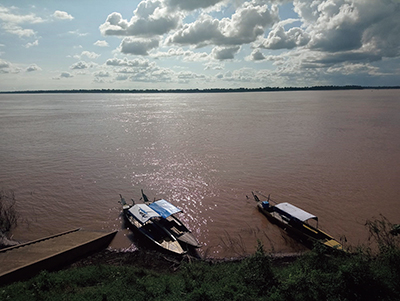 Mekong River (November, Krong Kracheh, Cambodia)
Mekong River (November, Krong Kracheh, Cambodia)At the 12th Mekong-Japan Summit Meeting held via video teleconference in November, Prime Minister Suga announced “Five Points of Cooperation” as Japan's tangible contribution ((1) promotion of loans and investment for the private sector; (2) grant assistance for Grass-Roots Human Security Projects that pervades through small communities; (3) cooperation concerning the rule of law; (4) cooperation concerning the ocean; and (5) cooperation concerning strengthening supply chains), and expressed his determination to continue vigorously promoting Mekong-Japan cooperation.
Mekong-Japan cooperation, which has been progressing steadily through these efforts, will be elevated to new heights through the Mekong-Japan Summit Meeting that will be held in Japan in 2021. As an Indo-Pacific nation, Japan will stand by the people and societies of the Mekong countries while deepening the mutually strengthening partnership going forward.
(5) ASEAN Plus Three (Participating Countries: 10 ASEAN countries and Japan, China and the ROK)
The Asian financial crisis in 1997 prompted the launch of ASEAN Plus Three, in the form of adding the three countries of Japan, China and the ROK to ASEAN. ASEAN Plus Three has been developed with a focus on areas such as finance and food security. It currently covers cooperation in 24 fields, including finance, agriculture and food, education, culture, tourism, public health, energy and the environment. Under the “ASEAN Plus Three Cooperation Work Plan (2018-2022)” adopted in August 2017, the ASEAN Plus Three countries have been making further progress on cooperation in various fields.
In April at the behest of Viet Nam, the ASEAN Chair for 2020, the Special ASEAN Plus Three (Japan-China-ROK) Summit on Coronavirus Disease 2019 (COVID-19) was held, and Prime Minister Abe announced three support measures for ASEAN: (1) strengthening capabilities to control infectious diseases, (2) establishing an ASEAN Centre for Public Health Emergencies and Emerging Diseases, and (3) supporting economic resilience. He said that through strong cooperation the leaders should confront the virus, which was already spreading across national borders, and was supported by participating countries. Additionally, he emphasized that the flow of goods should be maintained even during the crisis, stated that any measures should be consistent with WTO rules, and received the support of participating countries. A joint statement was issued after the meeting, which reaffirmed the common commitment to strengthen solidarity, cooperation and mutual support among the ASEAN Plus Three countries to control and contain the spread of the pandemic.
At the 23rd ASEAN Plus Three Summit Meeting (teleconference) held in November, as a follow-up to the support measures announced at the Special ASEAN Plus Three Summit in April, Prime Minister Suga (1) regarding medical cooperation, expressed Japan's intention to provide assistance worth more than 200 million US dollars in medical supplies and equipment as well as extending technical cooperation for medical research institutions and others, and additionally, (2) mentioned that the establishment of the ASEAN Centre for Public Health Emergencies and Emerging Diseases had been formally announced at the Japan-ASEAN Summit Meeting, and that Japan would continue to provide support in order to ensure that the Centre, as a hub for the region's fight against infectious diseases, develops into an organization that will protect ASEAN's people from the threat posed by infectious diseases, and furthermore (3) on support to revitalize the economy, explained that Japan had provided a total of approximately 2.5 billion US dollars' worth of financial assistance in yen loans to ASEAN countries.
Furthermore, Prime Minister Suga said that in addition to the 300,000 US dollars donated collaboratively from the ASEAN Plus Three Cooperation Fund to the “COVID-19 ASEAN Response Fund” as a follow-up to the Special ASEAN Plus Three Summit Joint Statement adopted in April, Japan had decided to make its own contribution of one million US dollars. With regard to the ASEAN Plus Three Emergency Rice Reserve, Prime Minister Suga stated that Japan had improved the management of the rice reserve so that it could be effectively used to respond to COVID-19, and that Japan would like to cooperate with each country so that the rice reserve could be used more effectively. In addition to these items, Prime Minister Suga said that Japan was aiming for the early entry into force of the RCEP Agreement, and that in ASEAN Plus Three cooperation, Japan would promote the creation of rules based on “Data Free Flow with Trust,” and would promote measures against marine plastic debris.
With regard to North Korea, Prime Minister Suga emphasized the full implementation of United Nations Security Council Resolutions (UNSCRs), including by addressing “ship-to-ship transfers,” is essential to achieving the complete, verifiable and irreversible dismantlement (CVID) of all weapons of mass destruction and ballistic missiles of all ranges of North Korea. He said that Japan's policy of seeking normalization of its relationship with North Korea through comprehensively resolving the outstanding issues of concern, such as the abductions, nuclear and missile issues, as well as settling the unfortunate past, remains unchanged, and that he is determined to meet directly with Chairman Kim Jong-un without any preconditions, and furthermore, asked for continued understanding and cooperation toward the early resolution of the abductions issue. In response to this, many countries emphasized the importance of the complete denuclearization of the Korean Peninsula and the implementation of the UNSCRs.
(6) East Asia Summit (EAS) (Participating Countries: 10 ASEAN countries and Japan, China, the ROK, Australia, New Zealand, India, the U.S. and Russia)
Launched in 2005, the EAS is the premier forum of the region, which aims to facilitate candid dialogue among leaders on issues of importance to the region and the international community, and to promote leaders-led cooperation in politics, security and economy. Moreover, many democratic nations take part in the EAS, and it is expected that the EAS will contribute to the sharing of fundamental values in the region, including democracy and the rule of law, as well as to strengthening international rules and norms concerning trade and investment.
At the 10th East Asia Summit Foreign Ministers' Meeting (teleconference) held in September, Foreign Minister Motegi stated that the vision for the Indo-Pacific outlined in the “ASEAN Outlook on the Indo-Pacific (AOIP)” and Japan's concept of a “Free and Open Indo-Pacific (FOIP)” share many fundamental values in common, including openness, transparency and the rule of law, and reaffirmed Japan's intention to fully support the AOIP. Foreign Minister Motegi also stated Japan's position on the situation in North Korea, the East China Sea, the South China Sea and Hong Kong.
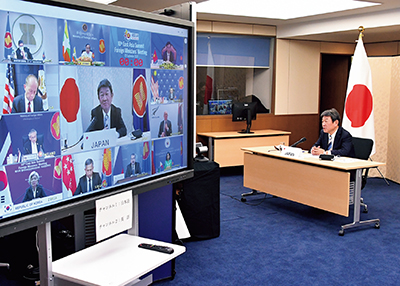 Foreign Minister Motegi speaking at the 10th East Asia Summit Foreign Ministers' Meeting (teleconference) (September 9, Tokyo)
Foreign Minister Motegi speaking at the 10th East Asia Summit Foreign Ministers' Meeting (teleconference) (September 9, Tokyo)With regard to North Korea, Foreign Minister Motegi emphasized the need to maintain and strengthen measures to ensure the full implementation of UNSCRs, including by countering “ship-to-ship transfers” in order to achieve the complete, verifiable and irreversible dismantlement of all weapons of mass destruction and ballistic missiles of all ranges in accordance with the UNSCRs. Foreign Minister Motegi also asked for continued cooperation of each country toward the early resolution of the abductions issue.
Foreign Minister Motegi, with regard to the East China Sea and the South China Sea, stated that Japan shares serious concerns about the continuing situation of attempts to unilaterally change the status quo with the EAS participating countries, and called on the participating countries to take constructive actions to improve the situation. In addition, on the issue of the South China Sea, he emphasized the need to uphold legitimate rights based on international law such as freedom of navigation and overflight as reflected in UNCLOS, and expressed support for the manifestation by ASEAN countries of their legal positions based on UNCLOS. Furthermore, Foreign Minister Motegi stated that the Code of Conduct for the South China Sea must not prejudice the rights of third parties and must be consistent with UNCLOS. As for the recent situation surrounding Hong Kong, Foreign Minister Motegi expressed Japan's grave and growing concern over the recent series of developments, including the enactment and subsequent implementation of the national security law, and stated that it is important that Hong Kong upholds a free and open system, the freedoms and rights of the people in Hong Kong, as well as people and businesses from all countries, are respected, and that Hong Kong will continue to develop in a democratic and stable manner under the “One Country Two System framework.
At the 15th East Asia Summit (teleconference) held in November, there were discussions on the state of the Indo-Pacific and on politics and security. Prime Minister Suga said that the “ASEAN Outlook on the Indo-Pacific (AOIP),” issued by ASEAN, shares many fundamental commonalities with a “Free and Open Indo-Pacific (FOIP)” promoted by Japan, and that Japan fully supports the AOIP, and called on each country for their support. In addition, at the Japan-ASEAN Summit, Prime Minister Suga stated that Japan and ASEAN confirmed they would proceed with concrete projects, in line with the AOIP and FOIP, and that Japan, as an “Indo-Pacific State,” would continue to lead efforts for peace and prosperity in the region. Furthermore, Prime Minister Suga said that Japan would strongly support the ASEAN Centre for Public Health Emergencies and Emerging Diseases, the establishment of which was announced following the Japan-ASEAN Summit, and that Japan would promote the provision of medical supplies and equipment and technical cooperation to ASEAN countries.
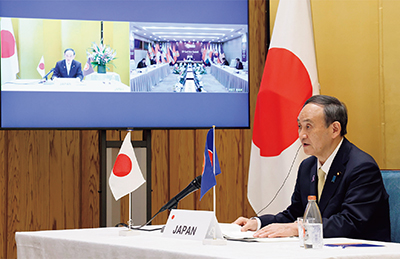 Prime Minister Suga attending the 15th East Asia Summit (EAS) (teleconference) (November 14, Prime Minister's Office; Photo: Cabinet Public Relations Office)
Prime Minister Suga attending the 15th East Asia Summit (EAS) (teleconference) (November 14, Prime Minister's Office; Photo: Cabinet Public Relations Office)With respect to the regional situation, Prime Minister Suga pointed out that developments contrary to the rule of law and openness have been unfolding. In the East China Sea, there have been continuing activities that infringe on Japan's sovereignty and in the South China Sea, actions that increase tensions such as ballistic missile launches and further militarization of the features, and claims that are inconsistent with UNCLOS. The COC in the South China Sea should be consistent with UNCLOS, and should respect the legitimate rights and interests of all stakeholders. Prime Minister Suga stated that Japan shares serious concerns with other countries about the current situation in the South China Sea and once again emphasized the importance of the rule of law and peaceful means. At the Summit, many countries mentioned the importance of freedom of navigation and overflight and the peaceful resolution of disputes in accordance with international law as reflected in UNCLOS. In addition, several countries expressed their concerns over recent situations on the ground and referred to the importance of non-militarization and self-restraint. As for Hong Kong, Prime Minister Suga said that Japan has grave and growing concerns over the series of developments such as the enactment of the national security law, and that it is important that Hong Kong upholds a free and open system, the freedoms and rights of the people in Hong Kong, as well as people and businesses from all countries, are respected, and that Hong Kong will continue to develop in a democratic and stable manner under the “One Country Two System” framework.
Regarding North Korea, Prime Minister Suga stated that the full implementation of UNSCRs, including by addressing “ship-to-ship transfers,” is essential to achieve the complete, verifiable and irreversible dismantlement (CVID) of all weapons of mass destruction and ballistic missiles of all ranges of North Korea. In addition, Prime Minister Suga asked for continued understanding and cooperation toward the early resolution of the abductions issue. In response to this, participating countries referred to the importance of the complete denuclearization and a peaceful solution through dialogue, condemnedmissile launches, and mentioned the importance of complying with the UNSCRs.
(7) Japan-China-ROK Trilateral Cooperation
Trilateral cooperation among Japan, China and the ROK continues to be vital from the perspective of promoting exchanges and mutual understanding among the three countries that enjoy geographical proximity and share deep historical ties. Furthermore, as economies that play a major role in the world economy and serve as the force driving prosperity of the East Asian region, trilateral cooperation among Japan, China and the ROK is one of the areas of cooperation that has huge potential in efforts to tackle various issues in the international community.
In March, a Japan-China-ROK Foreign Ministers' Video Teleconference on COVID-19 was held with the participation of Foreign Minister Motegi from Japan, Minister of Foreign Affairs Kang Kyung-wha from the ROK, and State Councilor and Foreign Minister Wang Yi from China. Foreign Minister Motegi stated that the cooperation of the three countries responsible for the peace and stability of the region is important in responding to COVID-19, and both China and the ROK agreed on the importance of trilateral cooperation. Additionally, Foreign Minister Motegi stated that the cooperation of the health authorities in the three countries is important to bring the situation to a close, and that a Health Ministers' Meeting should be held as soon as possible, and in May, the 12th Tripartite Health Ministers' Meeting (THMM) was held. Furthermore, Japan received support from China and the ROK to hold the Olympic and Paralympic Games Tokyo 2020.
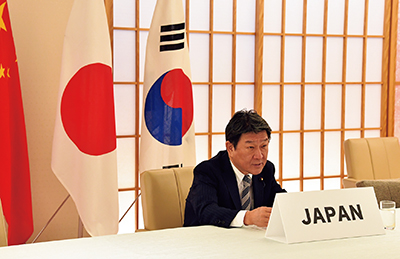 Foreign Minister Motegi attending the Japan-China-ROK Foreign Ministers' Video Teleconference on COVID-19
Foreign Minister Motegi attending the Japan-China-ROK Foreign Ministers' Video Teleconference on COVID-19(March 20, Tokyo)
(8) Asia-Pacific Economic Cooperation (APEC) (See Chapter 3, Section 2, 2)
Consisting of 21 economies (countries and regions) in the Asia-Pacific region, APEC promotes regional economic integration and cooperation across the region among the member economies on a voluntary basis. As the Asia-Pacific region is positioned as the “world's growth center,” strengthening economic cooperation and trust in the economic aspect in this region is crucial in pursuing Japan's further economic development.
At the 2020 Malaysia APEC Economic Leaders' Meeting, which was held as a virtual meeting for the first time, a Leaders' Declaration was adopted for the first time in three years. Additionally, the “APEC Putrajaya Vision 2040” was adopted, which represents APEC's direction after the Bogor Goals. Prime Minister Suga, who attended the Meeting, in addition to stating the particular importance of accelerating digital transformation and realizing a decarbonized society, promoting free trade, strengthening connectivity, and inclusive economic trade for economic growth in the “With COVID-19” and “Post COVID-19” eras, also emphasized Japan's active contribution to the realization of the new APEC Vision.
(9) South Asian Association for Regional Cooperation (SAARC)
SAARC was officially inaugurated in 1985 with multiple objectives such as enhancing the welfare of citizens of the South Asian countries, and cooperation and collaboration in economic and social development and cultural areas. As of 2020, SAARC has eight member states (India, Pakistan, Bangladesh, Sri Lanka, Nepal, Bhutan, Maldives and Afghanistan) and nine observer countries and institutions including Japan. As a relatively loose framework of regional cooperation, SAARC has worked primarily on economic, social and cultural areas, through summit meetings and meetings of the Council at the ministerial level (foreign ministers' meetings). As part of youth exchange between Japan and SAARC, Japan has invited around 3,615 people to date.


